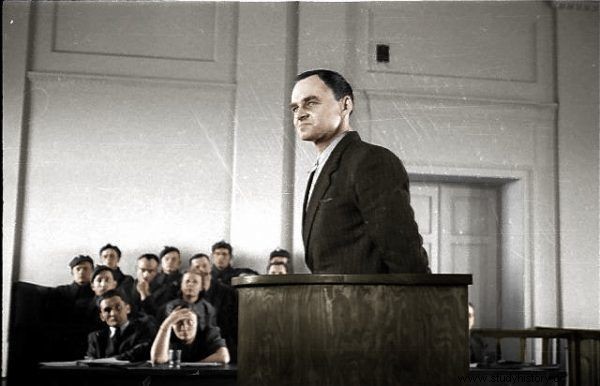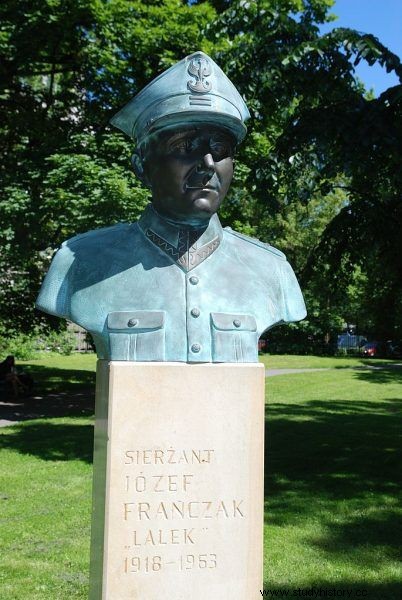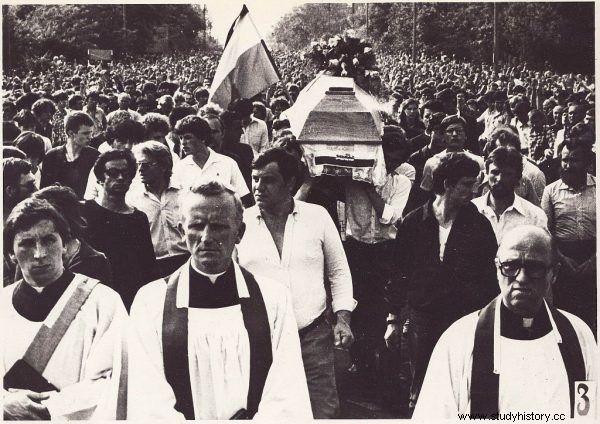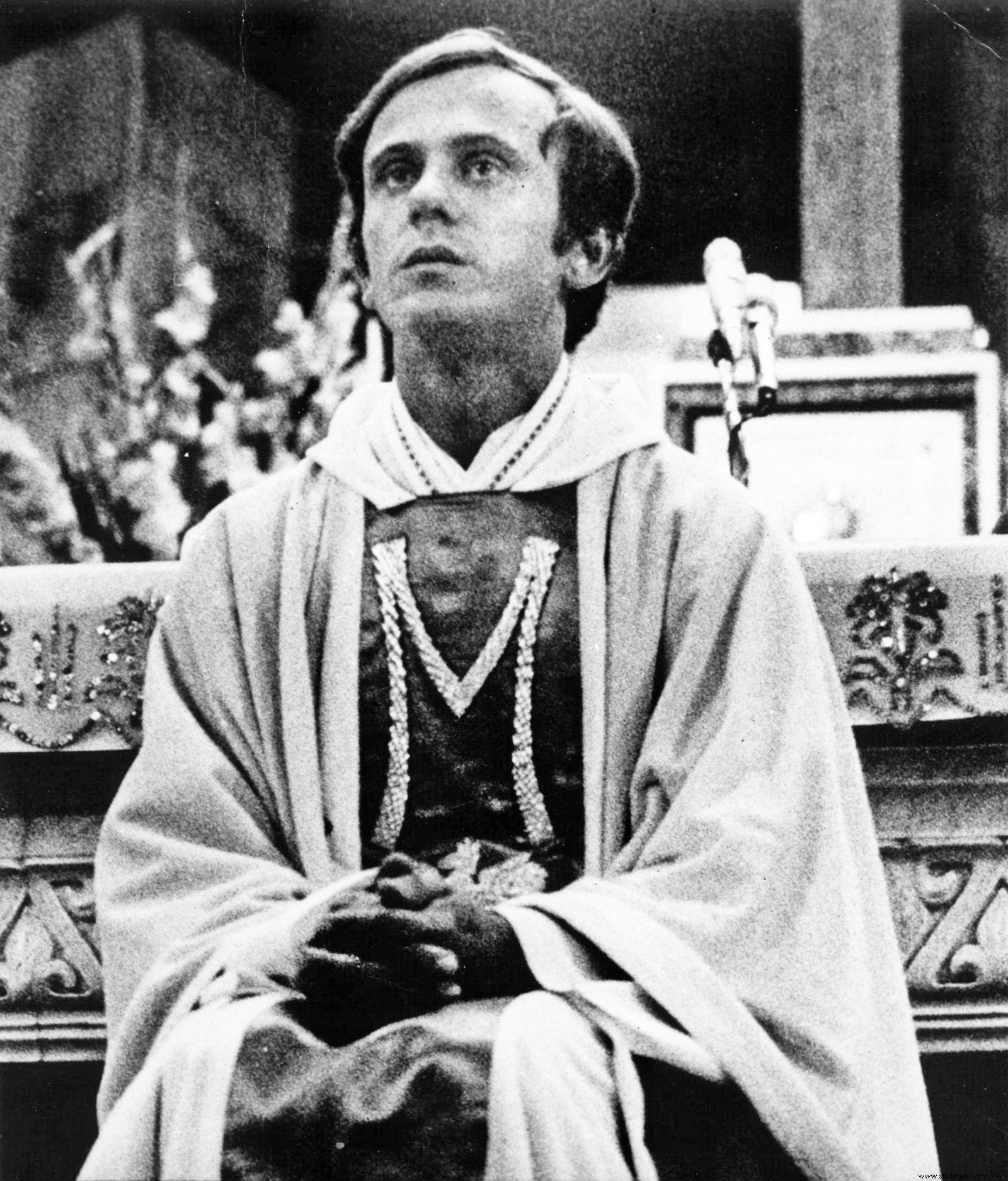Brutal physical and mental torture. Heavy beatings, mutilation of bodies, blackmail. Concealed and overt killings. The officers of the communist secret police did not stop at anything. After all, state "justice" has always been on their side ...
On May 8, 1947, in a boiler set up by the Security Office in an apartment at Pańska Street in Warsaw, Captain Witold Pilecki was arrested.
The 46-year-old Pilecki was a war hero, participant in the September Campaign and the Warsaw Uprising, an officer in the Home Army. He was also a voluntary prisoner of Auschwitz, where he let himself be locked up in order to create a resistance movement there. After the war, he organized an underground network collecting information about the situation in Poland and transferring it to the II Polish Corps in Italy.
Six months of torture
In the prison on Rakowiecka Street, Pilecki was subjected to a brutal investigation. He was interrogated, inter alia, by second lieutenant Eugeniusz Chimczak, one of the cruelest investigators of the secret police. The Captain was beaten in various ways. His genitals were crushed, he was placed on the so-called "Anders' stake", that is, on the leg of an inverted stool, and his fingernails were pulled out. He was also mentally harassed. For example, it was threatened that if he did not speak, his wife and children would end up in jail. The investigation and interrogations continued for six months. Pilecki tried unsuccessfully to hang himself and then strangle himself. During one of his visits with his wife, he confessed that compared to what was passed on to the UB, " Auschwitz was a game ”.
The Pilecki trial began in March 1948. After a trial of thirteen days, he was sentenced to death. The sentence was carried out on May 25, 1948 in the prison on Rakowiecka Street. The Captain was killed with a shot to the back of the head. The executor of the execution was sergeant Piotr Śmietański, known as the "executioner from Mokotów". For the performance of the task, he received… thousand zlotys in remuneration.

Witold Pilecki was interrogated and tortured by employees of the Security Office for many months. Finally, after a thirteen day trial, he was sentenced to death.
This is how the communists murdered one of the most distinguished officers of the underground and one of the greatest Polish national heroes. Many others were killed by the same method of court murder, such as Hieronim Dekutowski "Zapora", Kazimierz Kamieński "Huzar" and Zygmunt Szendzielarz "Łupaszka". A similar fate befell Stanisław Kasznica "Wąsowski", Łukasz Ciepliński "Pug" and August Fieldorf "Nil".
We beat and we will beat
Prison torture against Pilecki was on the agenda during the Stalinist period. Józef Dusza from the Investigative Department of the Ministry of Public Security reportedly stated:"in political matters we beat and we will beat, because this is the best way to force our enemies to tell the truth ". A case has been reported that in the Provincial Office of Public Security in Krakow, one of the interrogators was so massacred that in the prison hospital he had to have half a foot amputated.
Even after 1956, the methods of operation of the security services did not change significantly. The secret police tracked down the last soldiers of the post-war independence underground. The liquidation action of Józef Franczak, pseudonym "Lalek", a former Home Army soldier who hid the longest from the authorities of the Polish People's Republic, began on October 21, 1963.
Ten years in hiding
Franczak was a long-serving soldier. Before the war, he volunteered to join the military police. He took part in the September campaign, then served in the Union of Armed Struggle and in the Home Army. In 1944 he was forcibly drafted into the 2nd Polish Army. He deserted after seeing arrests and death sentences executed on Home Army soldiers.
After leaving the Polish Army, "Lalek" went underground and began to fight the new system. He carried out attacks on activists and government informers in Lublin, and flogged activists. He also attacked cooperatives to get money. When the underground was decimated, Franczak went into hiding. Supported by many kind people, he spent 10 years in hiding in a village near Lublin, from 1953 to 1963.

Józef Franczak, whose bust is located in the Jordan Park in Kraków, was the longest hiding soldier of the Polish independence underground.
The Security Service repeatedly tried to capture Franczak, but he always managed to break out of the manhunt and hide again. It was only in the 1960s that a man was ready to denounce him. It was a relative of "Lalka", Stanisław Mazur, an informant from the Security Service with the pseudonym "Michał". About 100 people were engaged in the capture of Franczak by the SB. On October 21, 1963, the operational group surrounded the farm in Majdan Kozice Górne. Franczak, who was firing his TT pistol, ran about 200 meters towards other buildings. However, he was hit by Zomowców machine guns. He fell on his face and passed away after two minutes.
The security finally managed to kill Józef Franczak after 18 years of underground activity. The most intransigent and longest hiding underground soldier was liquidated. However, killing "The Doll" was not enough for the communists. At the request of the district prosecutor , the body of Franczak ... had his head cut off and his mutilated naked body was buried in an anonymous grave in Lublin.

During interrogations by security officers, brutal beatings were often carried out. Some of them were fatal, as in the case of the young Grzegorz Przemyk. His death touched Poles, and his funeral attracted crowds of mourners.
The head of the "Doll" was not found until 2007 in one of the laboratories of the Medical University of Lublin. It was used there for educational purposes. The traitor of Franczak, Stanisław Mazur, received PLN 3,000 for denouncing a relative. This case was one of many. In a similar way, Jan Tabortowski "Furrow", Edward Taraszkiewicz "Żelazny", Stanisław Marchewka "Fish", Antoni Żubryd "Zuch" died after the war in the raids of the secret police, militia or the army.
High school graduates are celebrating
On May 12, 1983, in Castle Square in Warsaw, a group of teenagers loudly celebrated passing their final exams. Among them was 18-year-old Grzegorz Przemyk, son of the opposition poet Barbara Sadowska. At one point, policemen approached the amused boys and demanded identification. Przemyk's comment that after the suspension of martial law was no longer required to carry the ID card with him, the policemen decided to take him to a nearby police station at Jezuicka Street.
At the police station, three officers severely beat the young Przemyk. The fourth watched the action, saying:" Beat so that there are no traces ". The policemen beat the boy on the back, neck and kidneys with truncheons and fists, and when he fell to the ground - they kicked him. When their emotions subsided, they noticed that Przemyk would not be able to go home on his own. So they called an ambulance, informing the paramedics that the boy was "psychic" and "drug addict." Przemyk was not given any help at the emergency room. The next day, the boy's condition was so serious that he was taken to the hospital unconscious. There, an overnight operation was performed, which showed that his internal organs were cracked. The operation did not help, Przemyk died on May 14.
The case of the teen's fatal beating has become high-profile. Frightened by the publicity, the authorities created a special team to deal with public disinformation. An ambulance driver and a paramedic who transported Przemyk were selected as the guilty parties. They were arrested and subjected to onerous interrogations. They were physically and mentally harassed to try to force them to confess to beating.
The driver, driven to the limit of his endurance, made two suicide attempts. The interrogators threatened him with the death of his relatives. Finally, broken, he signed the confession. In 1984, in a specially conducted trial, the paramedic and the driver were found guilty of using violence against the patient and sentenced to 2.5 years in prison. Meanwhile, the real perpetrators of the beatings, the policemen from the police station on Jezuicka Street, were acquitted.
After 1989, the convicts were acquitted of the charges and the proceedings against the policemen were resumed. After many trials, appeals, appeals, amnesty and statute of limitations, none of the perpetrators of the beating went to prison. This is not the only such beating in the history of the Polish People's Republic. The security and, more broadly, the authorities eagerly used such a forceful argument against opponents and critics. Among others, Stefan Kisielewski, Jacek Kuroń, priest Tadeusz Isakowicz-Zaleski, Barbara Sadowska and Jan Rulewski were beaten by known or unknown perpetrators. Not all of them escaped from this meeting with the Security Service with life. The most famous victim of the beatings was Stanisław Pyjas, whose death on May 7, 1977 sparked mass student demonstrations.
A bag of stones
On October 19, 1984, a large Fiat used to return Father Jerzy Popiełuszko from Bydgoszcz to Warsaw was detained for inspection by policemen from the Road Traffic Department. They forced the priest to get out of the car, beat him up and threw him in the trunk. It turned out that the officers are not police officers from the traffic, but disguised officers from a special "D" Group dealing with fighting the Church.

The death of Father Jerzy Popiełuszko shocked the society. This is the loudest, but not the only, case of murdering a clergyman by the security services of the People's Republic of Poland.
The kidnappers moved their car towards Toruń. Since Father Jerzy, locked in the trunk, tried to get out, the torturers stopped from time to time and beat him unconscious. Finally, they tied him so that a cord connected his tucked legs and neck. Each attempt to straighten her legs made the noose around her neck tighten. Around midnight, they reached the dam on the Vistula River in Włocławek. There the Esbets took the tied priest out of the trunk, tied a bag of stones to him and threw him alive into the water.
The murder of a well-known opposition clergyman caused a shock in the country. The case was too serious to be covered up. Under pressure from public opinion, the authorities decided to arrest the perpetrators and arrange for them to be tried. The three killers and their immediate superior were sentenced to long prison terms. Later, however, these sentences were reduced twice.
All the circumstances of the murder, including its actual principals, have not been established to this day. This is not the only murder of a clergyman in the People's Republic of Poland. The secret police also killed priest Władysław Gurgacz, priest Stefan Niedzielak, priest Stanisław Suchowolec and priest Sylwester Zych. Some researchers estimate that about 100 priests were murdered in Poland in 1945-1989.
